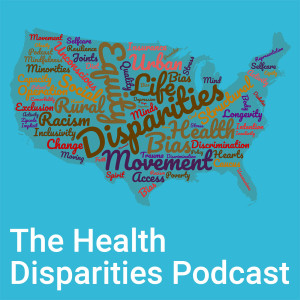The Health Disparities Podcast
The Health Disparities Podcast is the world’s leading health equity discussion forum and is a program of Movement is Life. This podcast features thought leaders in the world of equitable health, and highlights health disparities, social determinants of health and community-led solutions.
Episodes

Sunday May 10, 2020
Sunday May 10, 2020
Marking National Nurses Week 2020 and the bicentenary of Florence Nightingale's birth, nurse advocates and leaders from across the U.S. meet to celebrate the nursing profession and discuss many topics, including its diversity, future aspirations, and their nursing heroes. Featuring Rose Gonzalez, Millicent Gorham, Charla Johnson, Julie Kneedler, Doreen Johnson, and Mary Behrens.

Friday May 01, 2020
Friday May 01, 2020
Alameda County is home to 1.7M diverse Californians who have long experienced health disparities. Alameda Hospital System (AHS) CEO Delvecchio Finley takes us inside the workings of AHS as they adapt to the COVID-19 outbreak.

Friday May 01, 2020
Friday May 01, 2020
The disproportionate impact of COVID-19 on people of color is rightly making headlines. Reverend Dr. Franklyn Richardson of Grace Baptist Church in New York, a national leader for social justice, has seen his online church attendance blossom from 2,000 to 9,000 live-streams, and his church is feeding at least 500 families very week.

Wednesday Apr 29, 2020
Wednesday Apr 29, 2020
As a physician interested in health policy, UPMC orthopedic surgeon MaCalus Hogan MD, MBA, has helped develop cutting edge approaches. The University of Pittsburgh payer-provider model enables innovations in technology and delivery models, including value-based approaches that pre-date the Affordable Care Act era.

Wednesday Apr 22, 2020
Wednesday Apr 22, 2020
The circumstances around early childhood development have ramifications throughout a person’s life. Ronnie Musgrove, Governor of Mississippi between 2000 and 2004 discusses his conviction that early intervention is vital to good outcomes across education, health and the local economy.

Wednesday Apr 15, 2020
Wednesday Apr 15, 2020
Healthcare payment systems are so complicated that when it comes to fitting all the pieces together, hope may be the dominant strategy. Too often, policies and initiatives designed to improve healthcare quality hit a roadblock in payment systems, and the money cannot follow good intent.

Thursday Apr 09, 2020
Thursday Apr 09, 2020
Care providers taking care of joint replacement and broken bones are having to adapt their practices during the pandemic. In this podcast orthopedic surgeons from Connecticut, Georgia and Pennsylvania meet online to discuss some of the changes their health systems are making.

Wednesday Apr 08, 2020
Wednesday Apr 08, 2020
Dr. Claire Pomeroy continues her discussion with Dr. Bonnie Simpson Mason, considering how extensive rural poverty underpins rural health disparities, and how these are being made worse by hospital closures.

Friday Apr 03, 2020
Friday Apr 03, 2020
The COVID-19 podcast everyone needs to hear. Four experienced doctors working on the frontlines of healthcare share their words of wisdom. Together they discuss the important subjects...

Wednesday Apr 01, 2020
Wednesday Apr 01, 2020
Social determinants of health, the life circumstances in which we are born, educated, work and play, are powerful drivers of as much as 90% of our health status. Lasker Foundation President Dr Claire Pomeroy discusses ways that race, ethnicity, gender, socioeconomic status, the safety of our neighborhoods, having good access to food, and feeling part of a community all combine to impact health.






